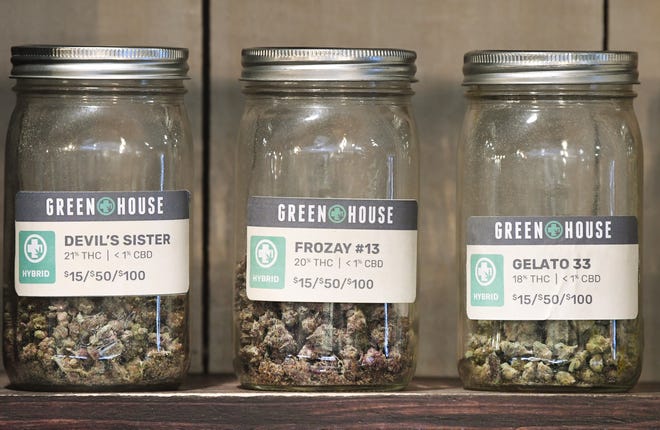MICHIGAN – A marijuana testing facility is suing state regulators after its work became the subject of one of the largest recalls in the Michigan marijuana industry’s fledgling, three-year history.
Viridis Laboratories said the recall of about 60% to 70% of the state’s on-shelf cannabis products was “unjustified, prejudiced and retaliatory,” according to a more than 200-page complaint filed Monday in the Michigan Court of Claims. The recall caused an estimated $229 million disruption in the industry, the suit said.
The testing facility’s CEO Greg Michaud served with the Michigan State Police for 25 years and retired from the agency as director of the forensic science division in 2016. The company’s research and development leader is Michele Glinn, a toxicologist and former program coordinator for the Michigan State Police crime labs.
The Marijuana Regulatory Agency said it was unable to comment on pending litigation.
Attorney David Russell said the state agency’s action was part of a “prolonged campaign of harassment aimed at Viridis.” Another attorney working for the company, Kevin Blair, said the agency disrupted the industry while disregarding “industry experts” and “widely accepted scientific practices.”
“There is no public health or safety risk justifying the recall at all, and we respectfully request the Court to provide relief to Viridis and bring accountability and oversight to an agency that has far exceeded its authority,” Blair said in a statement.
The suit asks for injunctions against the recall, citing violations of procedural and substantive due process rights and equal protection rights. It also requests ruling that find civil conspiracy, abuse of process and a dearth of authority at the agency to “summarily restrict” licenses.
Around the same time Viridis announced the suit Tuesday, Sen. Aric Nesbitt said he was requesting information from the Marijuana Regulatory Agency on the recall, including what led to the decision, the data used to justify the recall, a timeline for the investigation’s completion and the agency’s communication of the issue to licensees.
Nesbitt, R-Lawton, pegged the quantity of recalled product at 65,000 pounds but state regulators have been hesitant to quantify an amount.
“Any time a government agency takes action like this, it is important for the public to understand the basis of these decisions and know how your agency came to the conclusions that it did,” said Nesbitt, who is chairman for the Senate Regulatory Reform Committee. “With a highly regulated industry such as this, your agency has considerable power to impact the operations of Michigan businesses and the choices available to consumers.”
The Michigan Marijuana Regulatory Agency last week recalled product at about 403 medical and recreational sales locations after an alleged testing issue at Viridis Laboratories and Viridis North.
The agency said the recall was prompted by “inaccurate and/or unreliable results of products tested” by safety compliance facilities. The recall does not include inhalable marijuana concentrate products, such as live resin, distillate or vape carts.
Products affected were tested between Aug. 10 and Nov. 16. The state advised that the products should be properly disposed of or retested.
The potential harm from the products, the state agency said, includes health-related effects such as aspergillosis, an infection caused by a type of mold, among those with weakened immune systems.
Last week, Michaud said the company “strongly” disagreed with the decision and maintained the validity of its test results, noting the company is the “highest accredited cannabis testing facility in the state.” But, Michaud said, “we are fully cooperating with the MRA and working closely with our customers to minimize interruptions and retest affected products at no cost.”
Viridis in its lawsuit alleged the recall was implemented in an effort to “level the playing field” by cutting into Viridis’ ability to provide testing for 60% to 70% of Michigan’s growers and producers. The company alleged that the recall was a means to reach a “desired political result that it could not achieve through the powers delegated to it under Michigan law.”
But this fall, the Marijuana Regulatory Agency told Viridis it had received complaints about the company allegedly inflating potency level testing and allegedly guaranteeing approvals on retesting.
“Plaintiffs engaged in no such conduct,” the suit said.
In October, as part of of an audit, the state agency emailed other testing facilities asking them to retest Viridis-tested samples to determine the reliability of Viridis’ microbial testing. Those tests by Viridis’ competitors “ultimately failed,” the lawsuit said.
Three weeks later, the state released the findings to Viridis and, on the same day, notified the company that all of its tested cannabis products between Aug. 10 and Nov. 16 would be recalled.
The suit alleges that Viridis should have been able to argue its case before an administrative law judge before state regulators shut down its labs. The MRA also used “competitors” to audit the company and “moved the goalposts” when the company attempted to fix the situation, Viridis argued.
The recall was overly broad and included products that had not tested for aspergillus, including products at the company’s Bay City location, the lawsuit said.
“Plaintiffs have explicitly told the MRA numerous times that its orchestrated campaign of product holds and ignoring recall rules appears to be a deliberate choice to effectively shut down Viridis without following the established procedures to do so via summary suspension (which would involve some oversight and require the MRA to articulate its rationale to an ALJ),” the suit said.
“This has left plaintiffs no choice but to bring this action against the Marijuana Regulatory Agency.”

